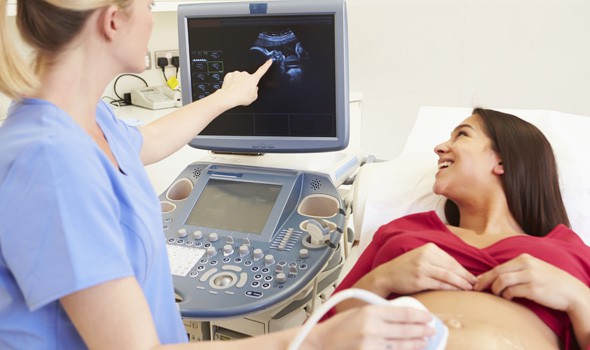Getting prenatal checkups early and regularly helps your doctor monitor your health as well as the health and development of your baby during pregnancy. You should schedule your first as soon as you suspect you are pregnant in order to get the care needed for a healthy delivery. What to expect during your prenatal checkups depends upon what stage you are at in your pregnancy but here are just a few examples.
Your First Visit
You probably will have your first official visit after your pregnancy’s eighth week to check on the status of things. Most doctors won’t schedule earlier unless you have had problems with a past pregnancy, you have a serious medical condition or you have symptoms that can include stomach, severe nausea and vomiting or spotting or bleeding. Your first visit will most likely be one of your longest.
You can expect your doctor to answer your questions (bring a list), take a urine sample to confirm your pregnancy and check for infection and record your height, weight and blood pressure.
You also can expect your doctor to calculate your pregnancy due date based upon an ultrasound exam and your latest menstrual cycle. Your doctor will ask you about health, including prior pregnancies, surgeries and health conditions, family health history and genetic history. He or she also will ask lifestyle questions, such as whether you exercise regularly, smoke, drink alcohol or take illegal drugs and your general stress level. Using all this data will better help them serve you and your unborn child.
Tests You Will Undergo
You can expect prenatal blood tests to establish your blood type and your Rh (Rhesus) factor, an inherited trait referring to a protein on the surface of red blood cells.
If the father is Rh positive and you are Rh negative, then your pregnancy will require a higher level of care. The doctor will run a blood count to check your levels of hematocrit, the volume of red blood cells to total blood volume and hemoglobin, which delivers oxygen to tissues. He or she also will test for HIV, syphilis, rubella and hepatitis B.
During your first prenatal checkup, you also can expect a complete physical examination, including a Pap smear to test for cervical cancer, a pelvic exam and chlamydia and gonorrhea cultures. Other tests will include an ultrasound (depending how far long your pregnancy is) and offer genetic testing for Down syndrome and other disorders, cystic fibrosis and other tests depending upon your health history.
Your Prenatal Checkup Schedule
If your pregnancy is regular and healthy, your next prenatal checkups probably will be monthly before 28 weeks, every two weeks from 28 to 36 weeks, then weekly from 36 weeks to birth. Your doctor will develop an individual schedule based upon your circumstances.
During these subsequent prenatal checkups, you can expect your doctor to check your blood pressure, track your weight gain and measure your abdomen (once you begin showing) to track your developing baby’s growth or “fundal height.” You also can expect him or her to check the baby’s heart rate, check for swelling in your hands and feet, feel your abdomen later in your pregnancy to determine the baby’s position, conduct more tests such as an ultrasound or blood tests and answer your questions.
Several visits will include gestational diabetes tests (between 24 and 28 weeks) as well as medical tests based upon your family history and age.
Prenatal Checkups for High-Risk Pregnancies
If it is determined that you have a high-risk pregnancy, you probably will undergo several additional tests as well as see a maternal-fetal specialist during your pregnancy. These tests could include a targeted or specialized ultrasound looking for abnormal development or other suspected problems and an amniocentesis test after the fifteenth week to identify some genetic conditions and neural tube defects (serious spinal cord of brain abnormalities). They also could include “chorionic villus sampling,” where a sample of cells is taken from the placenta, usually between the tenth and twelfth weeks, to test for some genetic conditions.
Another test you might undergo if you are considered high-risk is “cordocentesis” or “percutaneous umbilical blood sampling” which involves taking a fetal blood sample from the umbilical cord, usually after the eighteenth week. It is used to identify chromosome disorders, blood disorders and infections.
You also might undergo an ultrasound to measure the length of your cervix to gauge whether you are at risk for premature labor. Additional lab tests could include taking a vaginal swab to test your secretions for fetal fibronectin. It is substance that provides a bond between the lining of the uterus and the fetal sac. Its presence could indicate premature labor.
Going for prenatal checkups is an important part of your pregnancy. Physicians monitor your baby’s growth and development. They also help spot problems with you or your baby early. Make sure to maintain a regular schedule of appointments and follow your doctor’s directions.
Recent Posts
- Castor Oil For Better Hair Growth: Is It Myth Or Fact?
- Exploring the Differences Between Sermorelin, Ipamorelin, Ibutamoren, GHRP2, and GHRP6: Understanding Their Role in Human Growth Hormone Regulation
- Unraveling the Mystery: Understanding the Causes and Prognosis of Ventricular Tachycardia Without Apparent Heart Disease
- Understanding Grandparents’ Rights in Oklahoma: Navigating Visitation and Legal Protections
- 10 Reasons to Consider Hypnotherapy for Your Health


